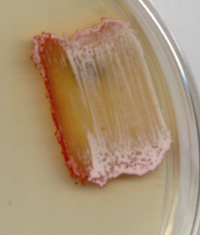Microbispora
Microbispora
Actinobacteria / Actinobacteria / Streptosporangiales / Streptosporangiaceae / Microbispora
Microbispora is a genus of aerobic, Gram-positive, non-acid–alcohol-fast, nonmotile, mesophilic, and thermophilic actinobacteria in the Streptosporangiaceae family which form branched substrate and aerial mycelia. Species of Microbispora have been isolated from soil, plant litter, and as epiphytes and endophytes of plants so far. Their typical genomic G+C content is around 68–73 %. The type species in this genus is Microbispora rosea Nonomura and Ohara 1957, 307AL.
Morphology
Spore chains, typically containing two spores, hence the name of the genus, which are formed longitudinally on short aerial hyphae. Mesophilic species grow from 20–37°C, with thermophilic species up to 55°C. Some Microbispora species can take 2-4 weeks to form visible colonies on agar plates and 4-6 weeks to form mature spores.
Secondary metabolites
Microbispora species can produce a number of bioactive secondary metabolites, including the lantibiotic microbisporicin.
References
- Nonomura, H., and Ohara, Y. (1957). Distribution of Actinomycetes in the soil. II. Microbispora, a new genus of the Streptomycetaceae. J. Ferment. Technol.35,307–3011
- Nouioui, I et al., (2018) Genome-Based Taxonomic Classification of the Phylum Actinobacteria. Front. Microbiol. 9. 2007 DOI. https://doi.org/10.3389/fmicb.2018.02007
